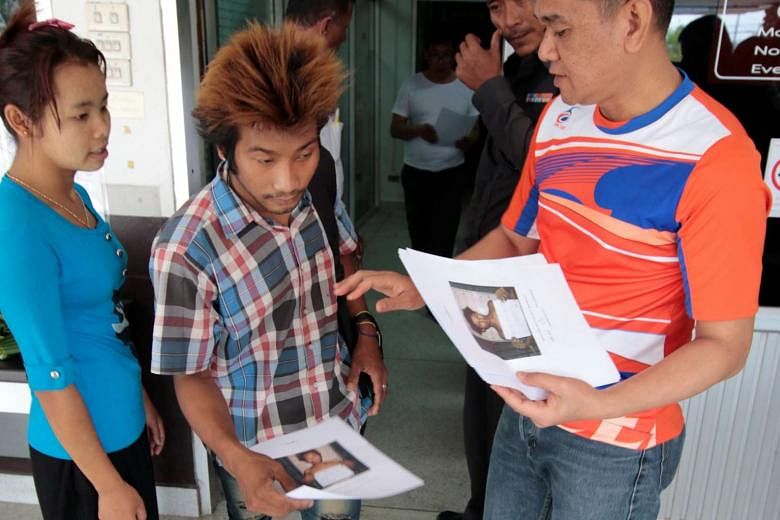MAE SOT, THAILAND (REUTERS) - People-smuggling across the border from Myanmar to Thailand is on the rise despite a crackdown by authorities in both countries that has made it more expensive and dangerous, Thai immigration police say.
Thailand said earlier this year that it hoped its efforts against smuggling would be recognised by the United States in its annual Trafficking in Persons report expected next month.
But while fewer migrants appear to be braving hazardous journeys by sea, figures from immigration police on the land border show an increase in people being smuggled from Myanmar since 2014, when Thailand's military government seized power and vowed to crack down on human smuggling and trafficking rings.
"We've applied a lot of pressure so they have to find a new way to come," Mr Sompong Saimonka, deputy superintendent of Border Immigration Police in Thailand's western Tak province, the main land gateway from Myanmar, told Reuters.
"We can't keep tabs on it all."
While Myanmar's economy has been booming - the World Bank forecasts annual growth will average 7.1 per cent over the next three years - wages remain among the lowest in the region.
Migrants from Myanmar often do work that Thais shun in sectors such as construction, agriculture and fishing, forming the backbone of South-east Asia's second largest economy.
The two countries signed an agreement last year to allow migrants from Myanmar to legally work in Thailand. But many are unwilling to wait up to six months for identity documents and prefer to take their chance with the smugglers instead.
CRACKDOWN ON SMUGGLERS
Thailand's crackdown on human smuggling and trafficking syndicates reverberated around the region in 2015 and drew global attention to the abuses suffered by some of those seeking a better life.
Boatloads of migrants, many of them Rohingya Muslims escaping persecution in Myanmar's Rakhine state, were turned away by regional governments from Bangladesh to Malaysia after being abandoned at sea by smugglers.
Dozens of bodies of suspected migrants were discovered in jungle camps along the Thai-Malaysian border.
Thai police say the focus on sea routes to Thailand and Malaysia has prompted smugglers to resume overland trails where it is easier to avoid checkpoints.
Data from immigration police at Mae Sot, the main entry point into western Thailand, shows that the number of people being smuggled from Myanmar rose from 20,323 in 2014 to 24,962 in 2016.
Those were just the recorded cases, so the increase could partly be due to greater enforcement efforts. Few of those who were recently smuggled were Rohingya, police in Mae Sot said.
"At present Thailand is very conscious about human rights when it comes to labourers and we have opened for labourers from Laos, Cambodia and Myanmar to come and work in Thailand," said government spokesman Sansern Kaewkamnerd. "Thailand needs overseas labour. We just ask that it is correct."
Overall figures on illegal entry into Thailand were not available.
'ANYONE CAN BE A BROKER'
The 2015 crackdown led to the trial of some alleged human traffickers.
But police in Mae Sot say the network of people willing to act as brokers is wider than previously thought. "Anyone can be a broker. The problem is more widespread than we think. A Burmese factor worker in Mae Sot with a mobile phone can be a broker," said a former border police officer based in Mae Sot, who declined to be named because he said he feared for his safety.
Last year, in its closely watched report that ranks countries based on anti-trafficking efforts, the US State Department upgraded Thailand's status a notch to its Tier 2 "Watch List".
Thailand had been downgraded to Tier 3, the lowest level that could trigger sanctions, after the 2014 coup.
The report, which usually comes out in June, matters to Thailand's junta as it tries to fully normalise relations with Washington and to show it is tackling tough issues better than previous civilian administrations.
The Thai-Myanmar border in Tak province is approximately 500km long and includes the 327km-long Moie River. During the dry season, which typically begins in March and ends in May, parts of the river are low enough to cross by foot.
Since 2015, many brokers won't risk transporting migrants in large groups, said a former border police officer. Checkpoints have become more stringent, prompting smugglers to charge more.
Migrants typically pay up to 15,000 Thai baht (S$608) to be smuggled from the border area to Bangkok and other cities and towns in Thailand.
"Supply has gone down but demand for workers is still there so the fee for smugglers has gone up," Mr Yunus, a Myanmar Muslim broker in Thailand, told Reuters in a telephone interview.

